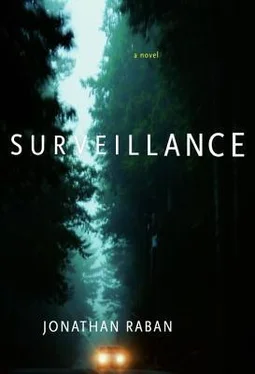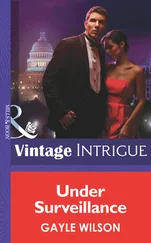Nobody liked her: Señora Benson was nutso.
THE WOMAN who came to the door was a graying blonde with wispy hair and a vague smile that seemed disconnected from the rest of her, and certainly had nothing to do with Lucy’s arrival. Explaining her appointment, Lucy saw alarm in the woman’s eyes.
Then her face cleared. “Ah, you’re the one who comes to lunch.”
There was a European tinge — German, or maybe Dutch? — to her accent. And was she the wife or the help?
Half turning in the doorway, she sang out, “Augie!” No reply. To Lucy she said, “He’s out there somewhere. Probably busy with his birds.”
Beyond the front door, colonial New England abruptly became California vacation rental: an enormous open space, awash with sunshine and overhung by cross-hatched yellow beams, in which the few sticks of furniture looked too old and small for their surroundings. Lucy took in a lonely couch covered in faded beige corduroy, mismatched rugs, a cane rocker, a rolltop secretary with dog-eared books behind glass. In another house, another time and place, these pieces might have fitted cozily, but here they had the forlorn shabbiness of enforced exile. The one concession to the lofty expanse of this unhomelike home was a very new-looking grand piano with something by Schubert on the stand.
“Are you the pianist?” Lucy asked.
“Me? No, him. He’s not too good yet. Plinkety-plonkety all day long. Scales!” She pronounced “Scales!” as if saying “Men!” with a sisterly wink at Lucy, yet her voice was fond.
They passed through sliding glass doors to the brick patio, where a lumpy pea-green cardigan was draped over one of the four Adirondack chairs and an American flag drooped in thick folds from an angled pole set into the back wall of the house.
“Augie?” She called again.
So they were Republicans — or was the flag just an island, waterfront thing? It looked brand new: no breath of wind or drop of rain appeared to have disturbed the virgin stitching of the stripes on the dimpled white fabric. In the lifeless air, it was as still as a sculpted marble flag on a war memorial.
“Where’s he got to? Augie? Company’s here!”
From around the corner of the house came a small man — shorter than his wife or Lucy — carrying a large pair of binoculars. His coarse white hair and bristly mustache were flecked with saffron.
“Hey there, how’s it going?” He exposed a set of teeth too gleamingly regular to be his own. His handshake, brief but fierce, was a little man’s handshake, making up in power for what he lacked in height. Lucy was reminded of something, but couldn’t quite place the memory.
Vanags set the binoculars on the slatted table next to a fast-disintegrating copy of Peterson’s Western Birds. “Birding,” he explained.
“My dad was a birder,” Lucy said. That same title — swollen, sun-bleached, leaking pages — used to live on top of the Jeep’s dash, and there was always a pair of army-surplus binocs in the pocket on the driver’s side.
“Know anything about gulls? I didn’t. When we first moved out here, all I saw was seagulls. Couldn’t tell ’em apart. I’m still a newbie, but I’m learning. Like a couple minutes ago, I figured that the little guy flying with a flock of black-headeds must be a Bonaparte gull — only a tad smaller, but with much paler undersides to his wings. I got a kick out of that. Made my day.”
“Bonaparte!” Mrs. Vanags said.
“My dad was a big sparrow man. He tried to teach me, but I could never see the differences.” Still learning to talk casually about him, she stumbled on a couple of words, fending off the image of Lewis Olson the rancher in his mania, brandishing the gun that killed her dad. “Fox sparrows, B-b-b-brewer’s sparrows, I tried to tell which was which but was sort of blind to them. That was in Montana.”
Fazed by the birding talk, Mrs. Vanags said, “You want coffee or anything?”
“I’m fine, thanks.”
“We’ll holler if we need you, Minna.” Minna— would that be Wilhelmina? — looked grateful for this dismissal and faded back into the house. “Want to stretch your legs? Let’s take a walk along the beach before it gets hot as a pizza oven out there.”
The memory Lucy had been looking for suddenly came to her. August Vanags was the White Rabbit in the framed Tenniel print that had hung over her narrow bed in Miles City when she was a kid. They had the same albino nattiness: the rabbit with his fob watch and tightly furled umbrella, Vanags in pressed khakis and immaculate white dress shirt, the cuffs folded back to expose a few inches of forearm, as if he’d been delivered fresh from the dry cleaner’s. He wasn’t at all what she’d expected, this eyewitness to atrocity, victim of Hitler and Stalin. Nothing of that experience showed on his face. He didn’t even have an accent. The crafty, vulnerable little European ragamuffin in Boy 381 had turned into a dapper little American retiree. Lucy could easily imagine him in sun hat and Bermuda shorts, swanning around the local golf course in an electric cart — but in the camps? The refugee trains? The Nazification program? She felt a surge of ambition for her GQ piece: to connect boy and man, European and American, she’d begin out here on the patio, with “I’m still a newbie,” the bird book, the flash of false teeth, and her initial disconcerted impression of August Vanags as a sort of living conjuring trick, a work of implausible self-transformation.
She followed him across the browning remnants of the lawn, avoiding the exposed white sprinkler heads whose use had been illegal since early last year. Pulled up on a sand berm at the lawn’s end were two kayaks, one red, one blue, like painted seedpods. Both looked new.
“I love to be out on the water,” Vanags said, “but it scares poor Minna.”
Bleached driftwood logs had piled up at the head of the beach. Stepping gingerly over them, Lucy found her elbow cupped by Vanags’ helping hand. It felt as though he were gripping her by the bone.
The sea was out, leaving behind it miles of puddled sand laced with crooked little saltwater creeks. As they walked, Vanags named every bird he saw. “Herring gulls,” he said. “Common murres.” Aheron waded fastidiously on fuse-wire legs, doubled by its own reflection. “Great blue heron.”
The smoke cloud to the south over Seattle had lightened to a patchy, pearl-gray stain on the blue. “It’s magical out here,” she said. “I’d forgotten how beautiful it is.”
“Thank you,” Vanags said, as if sea, sand, sky, and wildlife were his own handiwork. “Look — more murres.”
As soon as they were out of direct sight of the house, Vanags reached into his shirt pocket and fished out a slightly bent cigarette. “Please don’t say anything to Minna.”
Lucy laughed. “You really think she doesn’t know?”
“It’s like being a gay in the military — don’t ask, don’t tell. She doesn’t ask, I don’t tell.” He lit up, infecting the salt air with the musty stink of blown smoke. “I must have smoked my first cigarette when I was four, I guess. At five, I was quite the tobacconist.”
She knew that from the book — the boy scavenging for butts, mixing the tobacco strands (“stringy brown boogers”) with dirt and sawdust, and trading his roll-ups for stuff to eat. In the perverse world of wartime, starving people would barter bread for a hit of nicotine. Near the top of Lucy’s long list of hopes for Alida was that she’d never ever learn to smoke.
“Ah — black guillemot. Over there.”
The wet sand was silver-bright, the bird a blobby, ducklike silhouette.
“You know Ernst Mayr the biologist, the guy who figured out the importance of geography in evolution?” It was Mayr, Vanags said, who came up with the idea that new species were formed when creatures of one species became geographically isolated from the rest of their kind, on remote islands, across oceans or mountain ranges. Separated from their cousins, they adapted themselves to their new terrain until they could no longer breed with members of their original species and became genetically distinct.
Читать дальше












